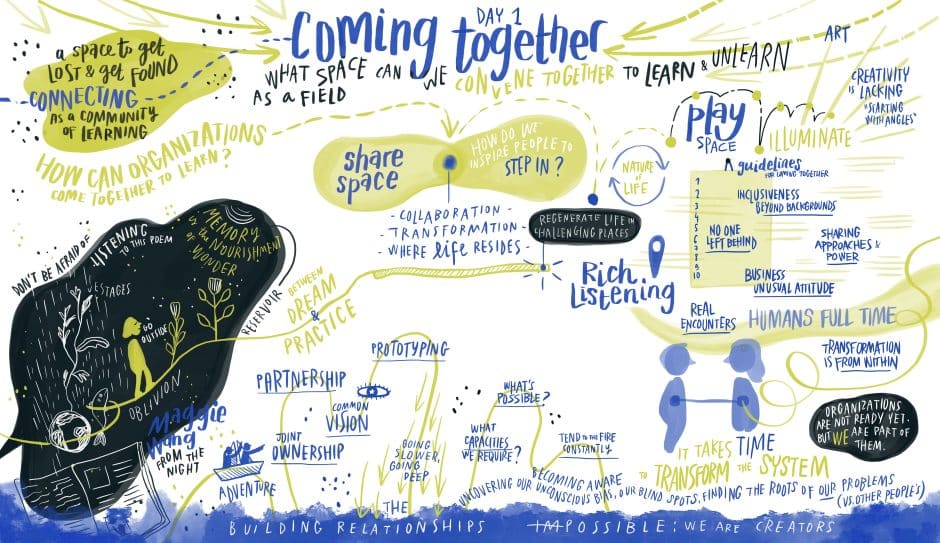Systems Innovation Learning Festival: Day One

In 2021, Climate KIC and Sida launched the Systems Innovation Learning Partnership to bring together organisations and people to collaborate, experiment, learn and share ideas that help to support innovation and transformation across whole systems. In this series, we will be hearing insights from three of the partnership’s learning practitioners as they reflect on this year’s edition of the Systems Innovation Learning Festival, which took place earlier in June.
Now that some time has passed since we joined together as a community of learning and practice, it feels like the right moment to reflect on the discussions we shared on that first day – which, in the spirit of curiosity, began with a sequence of questions:
- What qualities of relationships, and what practices, do we place value on as organisations come together to collaborate and learn?
- How can we inspire others with our own learning journey?
- What space can we convene together? And how can we expand the field of systems thinking, and make it more inclusive?
This final question deserves emphasis as we envision the festival less as a hierarchical space to learn from a panel of experts, and more as a shared space to learn from each other – and collectively contribute to what the field is becoming.
An aspect central to that development is our relationship with the arts, which is why we invited Maggie Wang to open the festival with her beautiful poetry. We were grateful to Maggie for joining us in, what was for her, the middle of the night, and her nocturnal words set a contemplative tone from which our discussions could grow.
Melting the organisational form
Vanessa Armendáriz, of the Sustainability Laboratory, began by sharing a thought-provoking truth on the unlocking of human potential:
“A forest will take 200 years to create a centimetre of fertile soil. However, humans can do this in just 15 days.”
While we must shine a spotlight on the destructive practices of humanity, it is important to remember what is possible if we’re meaningful and intentional with our actions. In that regard, when beginning a new partnership, we should come together with an understanding of our collective potential. But how do we begin a partnership? Nina Strandberg, Senior Innovation Advisor at Sida, reflected on our own collaboration:
“We realised early that we needed to move away from a traditional, transactional model towards a sense of joint ownership.”
This sense of challenging form and doing new things with old boundaries was echoed by the Presencing Institute’s Florentina Bajraktari, who invited us to rethink the organisational emphasis on speed: “resist the urge to go fast – first, you’ll go slow, and that’s ok.” This struck a chord with Nina, who added: “acting fast could mean we act on the wrong things,” before acknowledging that established processes are difficult to avoid: “how, then, do we counter the internal frustrations of going slow?”
Organic structures not organograms
In a results-driven environment, going slow can be difficult to justify. Florentina recognised this, but suggested that perhaps instead, we can reposition the argument:
“Just because we’re taking time to build structures and relationships slowly and organically, doesn’t mean nothing is happening. We’re prototyping. We’re in a research period. And the reason we slow down – at first – is because it will save so much time down the line.”
However, we agreed that there is clearly a flaw with traditional funding structures and their inability to sustain the long-term timeframe required for real systemic change – a point Vanessa felt pertinent to develop:
“It might take 10 or 20 years until we see progress, and this is often too long for some funders. But what happens to the people, or the ecosystems, if we begin a project that finishes after two years?”
Indeed, how can we create cyclical, regenerative systems – like we see in nature – that continue to nurture this transformation over time? “It’s clear” Vanessa concluded, “that we need to create different economic systems.”
Humans not human resources
As we approached the end of the first day, it became evident that we have to reimagine the way we form personal relationships and organisational structures – if we are to work and collaborate in a meaningful way. Consequently, our partnerships must become less transactional, and we should take time to build trust and be inclusive of the diverse needs and backgrounds of everyone involved – but how do we begin such a transformation? It might be appropriate to leave the final words to Vanessa, who challenged us all to step up:
“What is the leadership that’s required from all of us? We all work in organisations with ecosystems that aren’t working. So, what can we do to instigate change from within?”
As a continuation of our learning and practice, we are hosting a series of open dialogues, which we would be delighted if you could attend:
- 6 September 2023 – Leadership
- 27 September 2023 – New narratives and visioning
- 25 October 2023 – Confusion and crisis
- 22 November 2023 – Rethinking development funding
- 14 December 2023 – Radical collaboration
We are seeing an increased appetite to learn and co-create as members of the systems innovation community. If you would like to explore ways in which we can expand the field and convene more spaces of collaboration, please contact: silp@climate-kic.org
